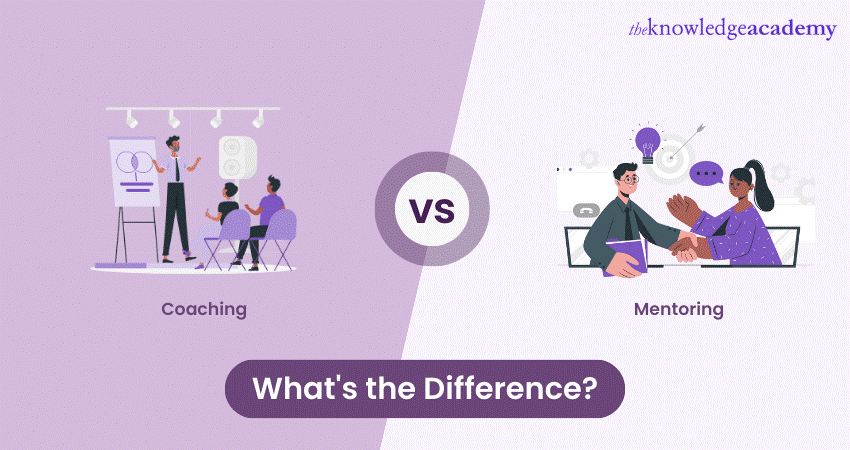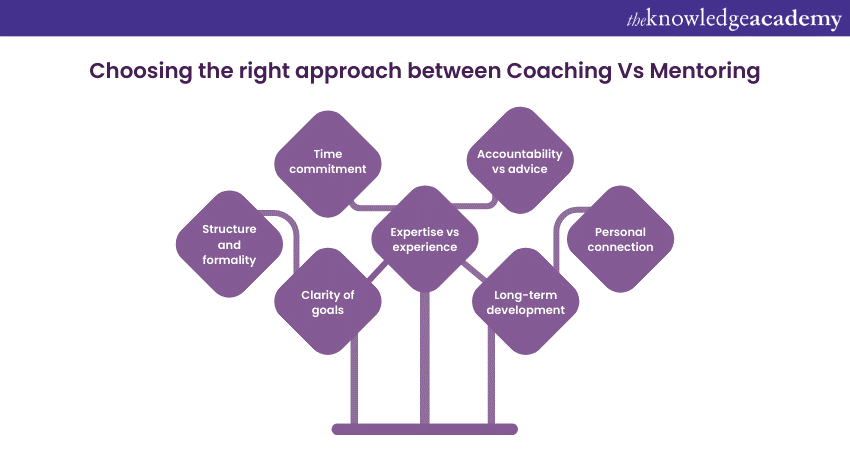We may not have the course you’re looking for. If you enquire or give us a call on 01344203999 and speak to our training experts, we may still be able to help with your training requirements.
Training Outcomes Within Your Budget!
We ensure quality, budget-alignment, and timely delivery by our expert instructors.

Coaching and Mentoring are two distinct approaches that provide valuable guidance and support for personal and professional development. While they both seem similar on the surface, they differ in several key aspects. Therefore, understanding the differences between Coaching vs Mentoring is crucial for choosing the relevant approach for your specific needs. Explore this blog about Coaching vs Mentoring to understand the differences between the two approaches and determine what’s best for you.
Table of Contents
1) What is Coaching?
2) What is Mentoring?
3) How is Coaching different from Mentoring?
4) Choosing the right approach
5) Conclusion
What is Coaching?
Coaching is a structured process where a Coach supports an individual in achieving specific goals and improving their performance in a particular area.
Coaches typically possess expertise in the field and utilise various techniques to enhance the individual's skills, knowledge, and abilities. They ask powerful questions, provide feedback, and assist in creating action plans to help individuals reach their objectives.

What is Mentoring?
Mentoring is a relationship-based approach. A Mentor, often an experienced professional, shares their wisdom, knowledge, and advice to guide the Mentee's overall development.
Mentoring focuses on long-term growth, providing insights, and helping the Mentee navigate challenges by drawing on the Mentor's own experiences. The role of a mentor is pivotal in offering guidance, sharing wisdom, and serving as a role model. It involves a more informal and personal connection between the Mentor and the Mentee.
Disseminate knowledge and sharpen your active listening skills by signing up for our Train the Trainer Course now!
How is Coaching different from Mentoring?
Coaching and Mentoring are two distinct approaches that provide guidance and support for personal and professional development. Understanding the key difference between Coaching and Mentoring can help individuals choose the most suitable approach. Here are the key differences between Coaching vs Mentoring:
|
Criteria |
Coaching |
Mentoring |
|
Purpose and focus |
Coaching primarily focuses on skill development, performance improvement, and achieving specific goals. It aims to enhance an individual's capabilities in a particular area. |
Mentoring, on the other hand, focuses on overall personal and professional growth. It provides guidance, advice, and support based on the Mentor's experiences and wisdom. |
|
Expertise and knowledge |
Coaches are typically professionals who possess specialised knowledge and skills in a specific field. During Coaching, they bring expertise to help individuals overcome challenges and develop specific competencies. |
Mentors, on the other hand, are experienced individuals who provide guidance based on their own career journeys. During Mentoring, they offer insights, share lessons learned, and provide support based on their broader experiences |
|
Structure and duration |
Coaching is often structured and follows a specific process. Coaches set clear objectives, establish action plans, and define timelines. Coaching engagements are usually shorter in duration, ranging from a few weeks to several months. |
Mentoring relationships, however, tends to be more flexible and less structured. They can span a longer duration, extending over months or even years. |
|
Relationship dynamics |
In Coaching, the relationship between the Coach and the individual being Coached is typically focused on the Coaching objectives. Coaches provide guidance, support, and accountability to help individuals reach their goals. |
In Mentoring, the relationship is more personal and often involves a Mentor sharing their experiences, providing advice, and acting as a role model for the Mentee. |
|
Scope of topics |
Coaching tends to have a narrower focus on specific skills, competencies, or areas of improvement. It addresses immediate needs and targets short-term goals. |
Mentoring, on the other hand, covers a broader range of topics. It encompasses career guidance, personal growth, professional development, and navigating challenges more holistically. |
|
Power dynamics |
Coaching typically involves an equal power dynamic. Coaches serve as facilitators, guiding individuals and helping them unlock their potential. |
Mentoring relationships often have a hierarchical dynamic, with Mentors offering guidance and acting as Mentors' role models. Mentors provide advice and support based on their experience and expertise. |
|
Level of formality |
Coaching tends to be more formal in nature, with structured sessions, defined goals and established Coaching agreements. There is often a contractual arrangement between the Coach and the individual being Coached. |
Mentoring, on the other hand, is often less formal and more relationship-driven. The Mentor and Mentee build a connection based on trust and mutual understanding. |
|
Emphasis on personal development |
While both Mentoring and Coaching support personal development, Coaching tends to place a stronger emphasis on individual growth and self-discovery. Coaches help individuals uncover their strengths, values, and potential areas for improvement. |
Mentoring focuses not only on personal development but also on career growth and guidance within a specific field or industry. |
|
Focus on immediate vs long-term development |
Coaching typically focuses on immediate development needs and short-term goals. Coaches help individuals overcome specific challenges and enhance their skills in a targeted manner. |
Mentoring takes a more holistic approach, emphasising long-term development and overall growth. Mentors support the Mentee's journey over an extended period, providing guidance on various aspects of their personal and professional life. |
|
Structure of communication |
Coaching sessions typically follow a structured communication framework. Coaches use Active Listening, powerful questioning, and feedback techniques to guide individuals through their thought processes and facilitate insights |
Mentoring conversations, on the other hand, often involve more open-ended discussions and storytelling. Mentors share their experiences and provide advice based on their own journeys. |
|
Frequency and intensity of interaction |
Coaching interactions often occur at regular intervals, such as weekly or bi-weekly sessions. These sessions are focused and intense, aimed at driving progress and achieving goals. In Mentoring relationships, interactions can be more sporadic and flexible. |
Mentors and Mentees connect as needed, seeking guidance and support when specific challenges or opportunities arise |
|
Outcome orientation |
Coaching is typically outcome-oriented, focusing on specific, measurable goals and results. Coaches help individuals set SMART (Specific, Measurable, Achievable, Relevant, Time-bound) goals and work towards their achievement. |
Mentoring, while also goal-oriented, places more emphasis on the journey and overall growth rather than strict outcome measurement. |
Understanding these key differences between Coaching and Mentoring is crucial, especially when considering the impactful realm of life coaching. This insight can help individuals make informed decisions tailored to their specific needs. Both Mentoring and Coaching, with a particular emphasis on life coaching, offer valuable support, and choosing the appropriate approach depends on the desired outcomes and your preferences. Exploring these distinctions ensures a more meaningful and effective personal development journey.
Get familiarised with effective coaching by signing up for our Coaching Skills Course now!
Choosing the right approach

Choosing between coaching and mentoring depends on your specific needs, goals, and preferences, each offering unique advantages. Understanding the benefits of mentoring and coaching can help you out to understand which one is best for you. Here are some considerations to help you make an informed decision:
|
Criteria |
Coaching |
Mentoring |
|
Clarity of goals |
Coaching may be the ideal choice if you have clear, short-term goals and seek targeted skill development. Coaches provide structured guidance to help you achieve specific objectives within a defined timeframe. |
If you desire overall personal and professional growth, guidance on career choices, and broader insights, Mentoring may be more suitable. Mentors offer wisdom based on their own experiences, fostering long-term development and providing support on various aspects of your journey. |
|
Expertise vs experience |
Coaching evaluates whether you require specialised knowledge in a specific area. |
Mentoring evaluates broader insights drawn from extensive experience. |
|
Structure and formality |
Coaching typically involves more structured sessions and agreements. |
Mentoring relationships tend to be more informal and flexible, allowing for a deeper, personal connection. |
|
Time commitment |
Coaching engagements are often shorter, ranging from a few weeks to several months. |
Mentoring relationships can be longer-term, extending over months or even years. |
|
Accountability vs advice |
Coaches provide accountability and hold you responsible for progress. During Coaching, they offer constructive feedback along the way. |
Mentors, on the other hand, offer advice, support, and wisdom based on their experiences. |
|
Personal connection |
Coaching tends to focus on specific goals and objectives. |
Mentoring relationships often involve a deeper personal connection and a broader range of guidance. |
Ready to level up your skills and unlock your full potential? Enroll now in our Mentoring Training Course and embark on a transformative learning journey!
Conclusion
We can conclude the Coaching vs Mentoring debate by establishing that both Coaching and Mentoring are distinct approaches that support individuals in their personal and professional growth. By understanding benefits of coaching and mentoring and their differences, you can choose the right approach that aligns with your goals and needs.
Ready to enhance your leadership skills? Enroll in our Coaching and Mentoring Training Course today!
Frequently Asked Questions
Upcoming Business Skills Resources Batches & Dates
Date
 Train the Trainer
Train the Trainer
Fri 14th Jun 2024
Fri 12th Jul 2024
Fri 9th Aug 2024
Fri 13th Sep 2024
Fri 11th Oct 2024
Fri 8th Nov 2024
Fri 13th Dec 2024







 Top Rated Course
Top Rated Course


 If you wish to make any changes to your course, please
If you wish to make any changes to your course, please


